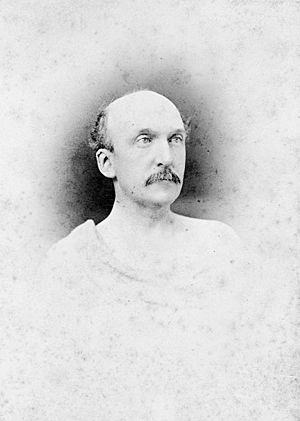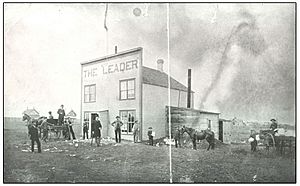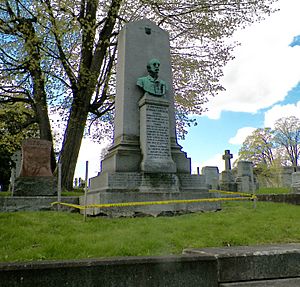Nicholas Flood Davin facts for kids
Quick facts for kids
Nicholas Flood Davin
|
|
|---|---|
 |
|
| Born | January 13, 1840 Kilfinane, County Limerick, (Ireland (U.K.))
|
| Died | October 18, 1901 (aged 61) |
| Resting place | Beechwood Cemetery |
| Alma mater | Queen's College Cork |
| Occupation | Writer, publisher, politician |
|
Notable work
|
The Irishman in Canada, Davin Report |
| Member of the Canadian Parliament for Assiniboia West |
|
| In office 1887–1900 |
|
| Preceded by | Electoral district created |
| Succeeded by | Thomas Walter Scott |
| Personal details | |
| Political party | Conservative Party of Canada (1867–1942) |
Nicholas Flood Davin (January 13, 1840 – October 18, 1901) was an important figure in early Canadian history. He was a lawyer, journalist, and politician. Davin was born in Kilfinane, Ireland, which was then part of the United Kingdom.
He became the first Member of Parliament (MP) for Assiniboia West from 1887 to 1900. Davin was known as a strong voice for the North-West region of Canada.
Davin started and edited the Regina Leader. This was the first newspaper in Assiniboia. He worked hard to make the territory a province.
Nicholas Flood Davin is also known for his role in creating the Canadian Indian residential school system. In 1879, he wrote a report called The Davin Report. This report suggested that the government should create residential schools for Indigenous children. In 2015, the Truth and Reconciliation Commission of Canada said that this system led to cultural genocide.
Contents
Nicholas Flood Davin's Early Life
Nicholas Flood Davin was the only son of Nicholas Davin and Eliza Davin. His father was a doctor. Some details about Davin's early life are not clear. It is thought that he changed some facts about his birth year and family background.
He was raised as a Protestant by his uncle. Davin briefly worked for an ironmonger. Then he went to Queen's College Cork for one year. After that, he moved to London. He studied law at the Middle Temple in London. He became a lawyer on January 27, 1868.
Davin's Work in England
Even though he studied law, Davin mostly worked as a journalist in England. He was the editor of the Monthly Journal. He also reported on Parliament for The Star. He worked as a war correspondent for The Standard and the Irish Times during the Franco-Prussian War. In 1872, he went back to Ireland to edit the Belfast Times.
Davin's Time in Toronto
In 1872, Davin moved to Toronto, Canada. He wrote for The Globe as a literary critic until 1875. After that, he worked as a freelance writer, especially for the Mail. He became a lawyer in Ontario in 1876. However, he focused more on writing than on law.
Davin became known in politics after giving a speech. In this speech, he spoke against republicanism. He supported monarchy and order. This speech was later published as a book called British versus American civilization (1873). In 1876, he helped start the youth section of the Liberal-Conservative Party in Toronto.
He also worked for the government. In 1873, he was secretary for a Royal Commission. This commission looked into the Pacific Scandal. In 1885, he was secretary for the Royal Commission on Chinese Immigration.
Davin's important early book was The Irishman in Canada (1877). This book told the history of Irish people living outside Ireland. It focused on famous people rather than social changes. He believed that Irish Catholics and Protestants in the New World would unite.
He also wrote poetry and a novel that was not published.
Moving to Western Canada
In 1882, Davin visited the West. This trip changed his future. In 1883, he started and edited the Regina Leader. This was the first newspaper in Assiniboia. His newspaper published detailed reports about the 1885 trial of Louis Riel.
Davin was a very good speaker. He was a Conservative MP for Assiniboia West from 1887 to 1900. He worked to make the territory a province. He also tried to get economic and property benefits for new settlers. He even supported the franchise for women, which meant women getting the right to vote. However, he never became a Cabinet minister.
Davin had a changing personality. He became sad as his political and personal life faced difficulties. He passed away on October 18, 1901.
Davin had an interesting and often successful career. After he died, his colleagues in Ottawa respected him greatly. They had his body sent from Winnipeg to Ottawa. He was buried in Beechwood National Cemetery. His grave has a special message carved in stone. It talks about his sincerity, bravery, clear mind, and great speaking skills.
The Davin Report
Nicholas Flood Davin is seen as one of the people who helped create the Canadian Indian residential school system. In 1879, the Canadian government sent him to study Indigenous education in the United States.
In his report, Davin praised efforts in the U.S. to gather Indigenous peoples on reservations. He also liked the idea of dividing shared land into private plots. He believed that industrial education could prepare Indigenous children for citizenship.
Davin thought that industrial boarding schools were better than day schools. In day schools, children went home after class. He felt they were still too influenced by their traditional ways. He believed boarding schools were the best way for Indigenous people to "merge and be lost" within the nation.
However, Davin also thought that setting up many industrial boarding schools in the northwest would be too expensive. This was because Indigenous groups there often moved around. So, he suggested that Canada use its existing church missions for the residential schooling system. Soon after his report, several government-supported boarding schools opened.
Davin's Writings
Davin often used ideas and styles from other famous writers in his work. These included British writers like Tennyson, Byron, and Shakespeare. He did this to connect ideas of empire with his audience in the 1800s.
In 1876, Davin wrote a play called The Fair Grit; or The Advantages of Coalition. A Farce. This play was based on Shakespeare's Romeo and Juliet. It made fun of government groups working together and how media could be unfair in Canadian politics. Davin understood the power of writing and newspapers, especially as he started the Regina Leader.
Three years later, Davin wrote Report on Industrial Schools for Indians and Half-Breeds (1879). This report is also known as The Davin Report. In it, he advised John A. Macdonald’s federal government to start residential schools for Indigenous youth. This recommendation helped lead to the creation of the Canadian Indian residential school system. This system caused great harm to Indigenous families in Canada.
In 1884, while visiting Ottawa, Davin wrote Eos – A Prairie Dream (1884). This was a collection of poems. Davin said these poems showed "a true and high note in Canadian politics and literature." Through his poetry, he also showed the destruction of Indigenous cultures.
Gunhilda Letters
Nicholas Flood Davin praised the 'Gunhilda letters'. He said they had "felicity of expression" and "keenness of satire." He thought "Nothing equal to them has appeared in the Canadian press for years."
In 1881, Susan Anna Wiggins used the pen name 'Gunhilda'. She wrote the Gunhilda Letters--Marriage with a Deceased Husband's Sister: Letters of a Lady to [John Travers Lewis], the Right Rev. the Lord Bishop of Ontario. These letters supported a bill by Mr. Girouard. This bill wanted to make it legal to marry a deceased wife's sister. This was something that British law had forbidden for a long time. The Gunhilda Letters were dedicated to members of the Senate of Canada and the House of Commons of Canada who supported Mr. Girouard's bill.



